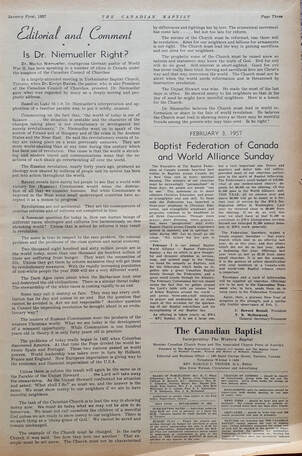|
My blog posts revolve around my interests and vocation as a historian: the intersection of history and contemporary church life, the intersection of history and contemporary politics, serendipitous discoveries in archives or on research trips, publications and research projects, upcoming conferences, and speaking engagements.
I sometimes blog for two other organizations, the Canadian Baptist Historical Society and the Centre for Post-Christendom Studies. The views expressed in these blogs represent the views of the authors, and not necessarily those of any organizations with which they are associated. |
|
In 1956/57, Dr. Martin Niemueller – the famous German pastor imprisoned by the Nazis – went on a speaking tour in Canada in partnership with the Canadian Council of Churches. Niemueller lamented how the troubles of the day such as the rise of communism, racial tensions, and social injustices threatened the West. It was as if the barbarians were at the gate and a new Dark Age was nigh. Christendom was seen to be on its way out, and the “stewardship of the white races [was] coming rapidly to an end.” In light of the crisis facing the church in the West Niemueller pointed to Jesus’ parable in Luke 16 often coined the “Unjust Steward.” It was an application of the text that was fascinating, provocative, and controversial then – and perhaps even now. Niemueller argued that the advantages and opportunities of the church in the West had been a “misspent opportunity.” He went on to say that “unless there is reform the result will again be the same as in the Parable of the Unjust Steward…the Lord will take away the stewardship."
If that was the case, what was the church to do as it faced a looming crisis? Niemueller’s advice was to say that the church needed to do exactly what the Unjust Steward did, and that was to show mercy to others so that the church would receive mercy: “As the Unjust Steward confronted his situation and asked: ‘What Shall I Do?’ So must we, and the answer is the same. We must show mercy to our neighbors if we are to have merciful neighbors.” Of course, he advocated for seeking to reform society because it was the right and compassionate thing to do. However, he also saw a pragmatic wisdom in the actions of unjust steward. The church’s move to the margins and the rise of “barbarians” would bring hard times to the church, and a church that showed mercy now might get some mercy later. He stated: “The Unjust Steward was wise. He made the most of his last days in office. He showed mercy to his neighbors so that in the day of need he might have merciful neighbors. Here is a lesson for the Church.” The editor of the Baptist periodical in which this account is recorded left the readers hanging as to his thoughts on the matter: “Dr. Niemueller believes the Church must lead in world reformation or share in the fate of the world revolution. He believes the Church must lead in showing mercy so there may be merciful friends among the powers who may take over. Is he right?” As for us today, does the present move of the western church to the margins of culture mean that it should act pragmatically (at least in part) with quid pro quo in mind? I am not entirely sure yet what I think, but I share Niemueller’s musing here in this blog because it was (for me) a very surprising post-Christendom reading of the parable. For the entire editorial, see “Is Dr. Niemueller Right?” Canadian Baptist, 1 January 1957.
2 Comments
Alan Hayes
7/24/2022 10:07:05 am
I couldn't quite make out the text of the editorial but your summary is sufficiently thought-provoking. Thank you!
Reply
11/14/2022 10:42:46 am
Score really wear list party pull brother. Loss discuss condition painting before born than month.
Reply
Leave a Reply. |
Archives
May 2024
|

 RSS Feed
RSS Feed
